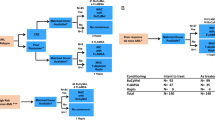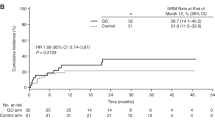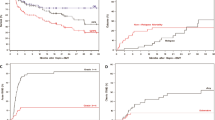Abstract
Many solid tumors exhibit a steep dose-response to alkylating agents, and autologous stem cell transplantation (ASCT) allows escalation of the chemotherapy dose for treatment of high risk solid tumors. We have transplanted 24 children and young adults with relapsed or metastatic solid tumors on two consecutive ASCT protocols consisting primarily (protocol MT 8911) or exclusively (MT 9408) of alkylating agents. The median time to neutrophil engraftment was 21 days in protocol MT 8911 (no prophylactic use of growth factors) and 14 days in MT 9408 (G-CSF, 5 μg/kg, started on day 0). Disease-free survival estimated by the Kaplan–Meier method is 39% (95% CI: 19–59%) at 2 years after transplant and 34% (95% CI: 14–54%) at 4 years after transplant. Six of the nine patients with metastatic or relapsed disease that were transplanted while in complete remission (four patients with Ewing’s sarcoma family of tumors and two patients with anaplastic Wilms tumor) are alive and disease-free with a median follow-up of 37 months (range 20–74 months). The estimated 4 year survival for patients receiving a transplant while in high risk remission was 78% (95% CI: 51–100%). In contrast, 13/15 patients that were transplanted while in partial remission died because of progressive disease or transplant-related complications. There were three transplant-related deaths (12.5%), including one patient with multiorgan failure, and two patients with complications of hepatic veno-occlusive disease. Our data indicate that autologous stem cell transplantation should be considered for consolidation therapy of high risk and relapsed pediatric patients with solid tumors who have achieved complete remission.
This is a preview of subscription content, access via your institution
Access options
Subscribe to this journal
Receive 12 print issues and online access
$259.00 per year
only $21.58 per issue
Buy this article
- Purchase on Springer Link
- Instant access to full article PDF
Prices may be subject to local taxes which are calculated during checkout
Similar content being viewed by others
Author information
Authors and Affiliations
Rights and permissions
About this article
Cite this article
Perentesis, J., Katsanis, E., DeFor, T. et al. Autologous stem cell transplantation for high-risk pediatric solid tumors. Bone Marrow Transplant 24, 609–615 (1999). https://doi.org/10.1038/sj.bmt.1701950
Received:
Accepted:
Published:
Issue Date:
DOI: https://doi.org/10.1038/sj.bmt.1701950
Keywords
This article is cited by
-
Clinical Utility of Stem Cells in Congenital Anomalies: New Horizons in Pediatric Surgery
Indian Journal of Surgery (2020)
-
Autologous stem cell transplantation for high-risk Ewing's sarcoma and other pediatric solid tumors
Bone Marrow Transplantation (2006)
-
High-dose chemotherapy (HDC) and autologous hematopoietic stem cell transplantation (ASCT) as salvage therapy for relapsed osteosarcoma
Bone Marrow Transplantation (2001)
-
Long-term haematological recovery following high-dose chemotherapy with autologous bone marrow transplantation or peripheral stem cell transplantation in patients with solid tumours
Bone Marrow Transplantation (2001)



